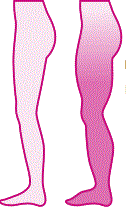
 Most people think drinking too much water can lead to edema. However, the amount of water intake does not lead to edema, but sometimes fix it. In fact, Swelling is caused by the accumulation of abnormally large amounts of fluid in the spaces between the body's cells or in the circulatory system. While we do not drink enough amount of water, our body will be in the state of dehydration and our body does not have adequate ability to flush out of toxins and salts. It thus slows down or even stops the normal lymphatic circulation causing the fluid pools in the lower extremities or the entire body, and a very sudden weight gain in some cases. Other negative effects can include lowering energy level and working performance.
Most people think drinking too much water can lead to edema. However, the amount of water intake does not lead to edema, but sometimes fix it. In fact, Swelling is caused by the accumulation of abnormally large amounts of fluid in the spaces between the body's cells or in the circulatory system. While we do not drink enough amount of water, our body will be in the state of dehydration and our body does not have adequate ability to flush out of toxins and salts. It thus slows down or even stops the normal lymphatic circulation causing the fluid pools in the lower extremities or the entire body, and a very sudden weight gain in some cases. Other negative effects can include lowering energy level and working performance.

Symptoms will mainly depend on the underlying cause. The following refer to generalized edema:
- Swelling of the skin
- The skin may retain a dimple after being pressed for about ten seconds
- Puffiness of the ankles, face or eyes
- Aching body parts.
- Stiff joints
- Weight gain
- Hand and neck veins are fuller
- Raised pulse rate
- Hypertension - raised blood pressure
- Ascites - increased abdominal size

- Physical inactivity
- Standing or sitting still for long
- High altitudes
- Heat - especially when combined with physical exertion
- Burns
- Pregnancy
- Menstruation and pre-menstruation
- The contraceptive pill
- Menopause
- Excessive salt intake
- Malnutrition and/or bad diet


|

|






























